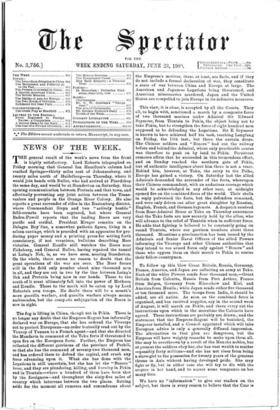This view, it is clear, is accepted by all the
Courts. They all, to begin with, sanctioned a march by a composite force of two thousand marines under Admiral Sir Edward Seymour, from Tientsin to Pekin, the object being not to take Pekin, but to strengthen the force of eight hundred men supposed to be defending the Legations. Sir E. Seymour is known to have achieved half his task, reaching Langfang on Friday, the 15th inst., but there the curtain drops. The Chinese soldiers and " Boxers " had cut the railway before and behind the Admiral, whose only practicable course was therefore to push on by land to Pekin. Persistent rumours affirm that he succeeded in this tremendous effort, and on Sunday reached the southern gate of Pekin, but of authentic intelligence about him there is not a trace. Behind him, however, at Take, the entry to the Peiho, Europe has gained a victory. On Saturday last the allied Admirals demanded the surrender of the forts, whereupon their Chinese commandant, with an audacious courage which would be acknowledged in any other race, at midnight opened fire on the combined fleets of the world. Their shells in reply pulverised the forts, but the defenders remained, and were only driven out after great slaughter by Resaian, English, French, and German bayonets. A despatch received from Rear-Admiral Bruce at Taku on Thursday announces that the Taku forts are now securely held by the allies, who will advance to the relief of Tientsin when in sufficient force. He adds that fighting is believed to be constantly going on round Tientsin, where our garrison numbers about three thousand. Meantime a proclamation has been issued by the Admirals and Senior Naval Officers of the allied Powers informing the Viceroys and other Chinese authorities that they intend to use armed force only against " Boxers " and those who oppose them on their march to Pekin to rescue their fellow-countrymen.


































